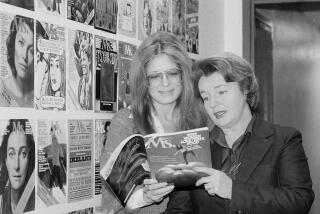Don’t Judge Offerings Just by Women’s Wire
- Share via
Are you obsessed with health, relationships, clothing and body weight? Does it really, really matter to you what your horoscope says or what celebrities wear? Do you need professional advice on, well, just about everything?
If so, you must be a woman. Or so we can conclude from Women’s Wire, a World Wide Web magazine that has re-created in cyberspace everything that is worst about many traditional women’s magazines.
Precisely why women’s magazines--and Women’s Wire itself, at https://www.women.com/--are this way is beyond me. All the women I know are vastly more interesting. Yet I guess it shouldn’t be surprising that the same stuff so prevalent in the old country, the hidebound nation of Print, has been brought over into the spanking-new Land of Internet by the homesteaders who’ve made their way onto this great and sparsely settled frontier.
Thus, since the Internet is so male, there’s a lot about sex, not to mention stuff about computers (although I guess this is what helped make the Net so male in the first place). And in an effort to interest women, some people have decided to treat them as the same sort of credulous narcissists many traditional women’s magazines do.
A recent issue of Women’s Wire, for instance, featured the story “What’s in Alicia Silverstone’s closet?” There was a quiz, of course, and in the advice department, a “sexpert” delivering such insights as “the media use sex to hype the marketing of cars, beer, breath mints and magazine covers. Sometimes a cold beer is just a cold beer and very satisfying in its own right.”
Because men outnumber women on the Internet by something like 2 to 1, it’s possible that women really do want something different from cyberspace. But I think my friend Anne has a better explanation when she says that women, with jobs and primary responsibility for housekeeping, children and so forth, simply don’t have as much time to waste.
I went searching for more substantive resources of interest to women who do have time for the Internet and was somewhat disappointed at the offerings.
One conclusion I draw from this is that women who use the Internet use it in much the same way men do (except maybe they consume less electronic porn). That is, they surf around, use the major search engines to find information, check out discussion groups on topics of personal or professional interest and send and receive lots of e-mail.
Nevertheless, there are some good resources of specific interest to women. Perhaps the best place to start is with Femina, at https://www.femina.com/. Femina is a sort of Yahoo for women, created “to provide women with a comprehensive, searchable directory of links to female-friendly sites and information on the World Wide Web.” You can use Femina to locate almost anything directly relating to women. I haven’t spent enough time on Femina to know whether it finds many things you can’t find on Yahoo (https://www.yahoo.com) or Alta Vista (https://www.altavista.digital.com/), but you can try it for yourself and see.
One of the most interesting resources in terms of women on the Internet is soc.feminism, a moderated newsgroup in which generally thoughtful people discuss how women might achieve equality, or even what equality for women might mean. All sorts of interesting things crop up. For instance, postings under “Women of Achievement and Herstory” regularly tell of women in history whom you probably haven’t heard of. The postings also include significant dates, such as the birthday (July 4, 1868) of Henrietta Swan Leavitt, “American astronomer who established the period-luminosity relation for Cepheid variable stars and aids to distance determinations of the furthest stars.”
There are several other newsgroups of interest to women, including some aimed at women in specific fields or involved in specific pursuits. If you’re a female biologist or biology student, you might want to check out bionet.women-in-bio, where tips on job hunting are traded. For a discussion of women’s basketball, visit rec.sport.basketball.women.
Soc.women and alt.feminism are two of the more active of the groups focusing on women, but they are also two of the more bombastic.
There are also a number of newsgroups focusing on subjects of interest mostly to women. For instance, there is the ever-popular rec.arts.tv.soaps groups. Rec.crafts.textiles.misc, rec.crafts.textiles.needlework, rec.crafts.textiles.sewing and rec.crafts.textiles.yarn might also be of interest.
And don’t overlook mailing lists. Liszt (https://www.liszt.com), the searchable database of nearly 55,000 electronic mailing lists, turned up 257 matches when I searched “women.” These included lists for women in agriculture, female veterinarians, Arkansas press women, female engineers, female Mormons, women scheduled to give birth in February, etc.
Female computer professionals will particularly want to check out the Mecca system, at https://www.systers.org/mecca, a membership-only organization that functions as a kind of support group for women in this traditionally male field. Mecca’s Web site reports that “as of January 1996, there were nearly 2,100 women in 22 countries representing over 170 companies and 230 colleges and universities on the list. We range from old-timers to relative newcomers, seasoned professionals to undergraduate CS and CE majors.” Women interested in politics and public affairs can use the traditional techniques to find a host of Internet resources. Few topics are more controversial, or of more concern to many women, than abortion. If you use Yahoo or Alta Vista, you’ll find a mountain of material from all sides of the question, from the National Abortion and Reproductive Rights League at https://www.naral.org/ to the National Right to Life Committee, at https://www.nrlc.org/
As for health-related information specifically about women, HealthGate (https://www.healthgate.com/) offers a free resource called “Healthy Woman.” (The logo is in a feminine sort of script with a sprout of some kind growing between words.) For an annual fee of $30, you can also access an online version of the new “Our Bodies Our Selves” at this site.
Daniel Akst welcomes messages at dan.akst@latimes.com. His World Wide Web page is at https:// www.well.com/~akst/






